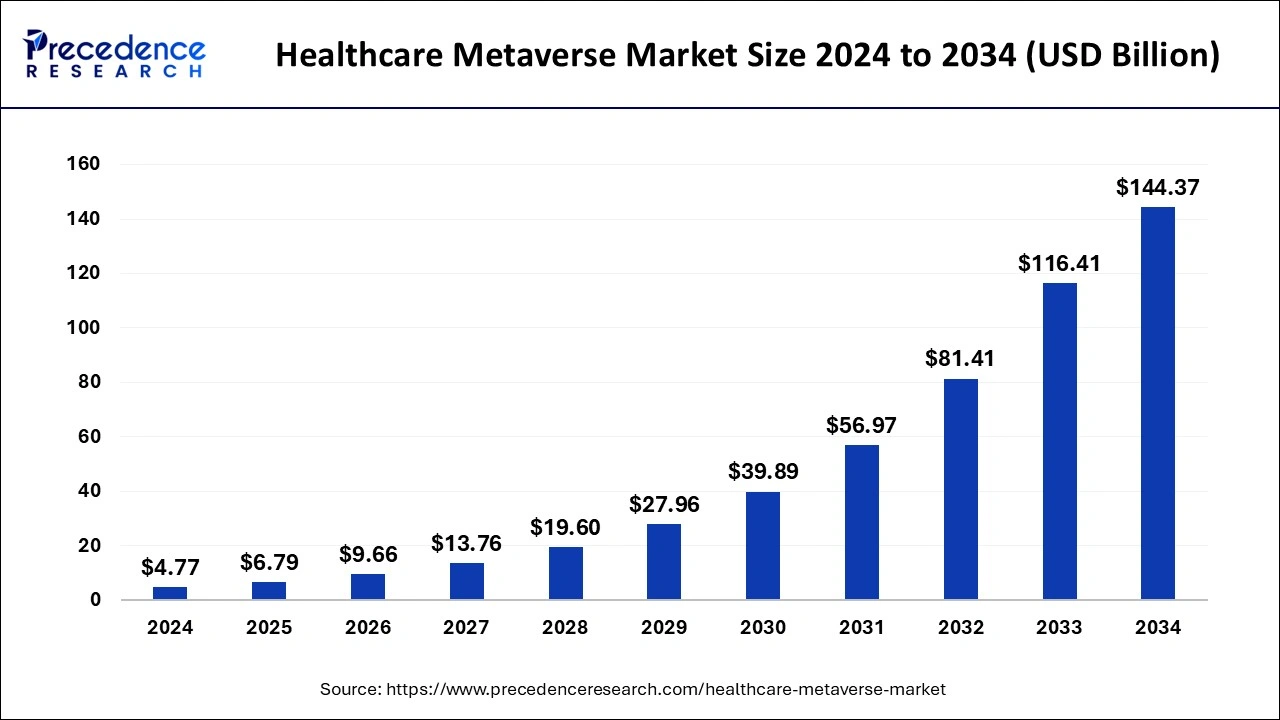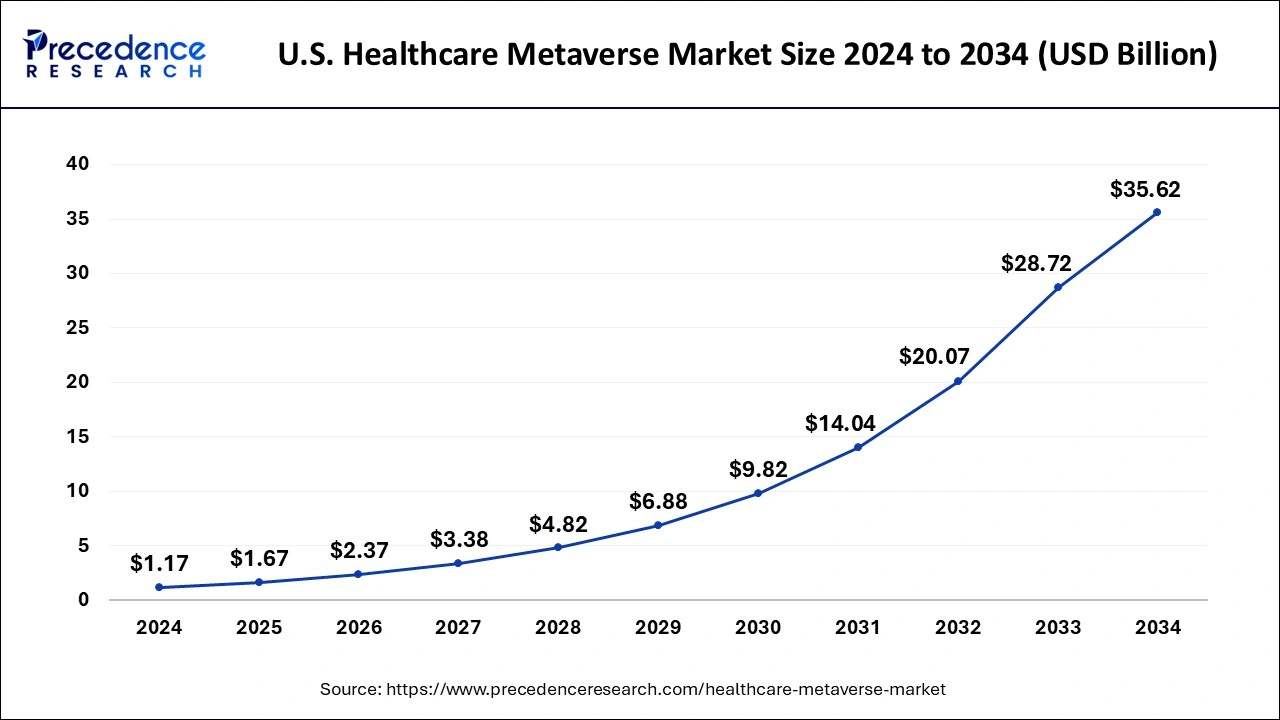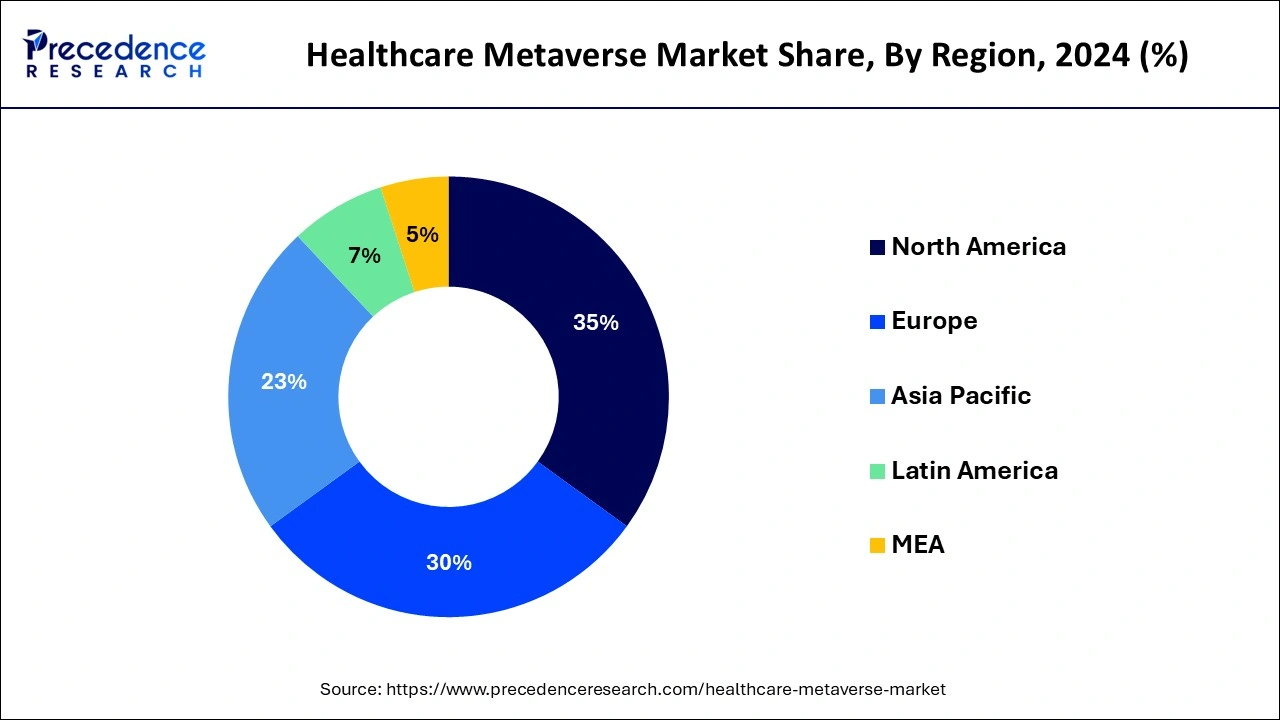January 2025
The global healthcare metaverse market size is accounted at USD 6.79 billion in 2025 and is forecasted to hit around USD 144.37 billion by 2034, representing a CAGR of 40.64% from 2025 to 2034. The North America market size was estimated at USD 1.67 billion in 2024 and is expanding at a CAGR of 40.67% during the forecast period. The market sizing and forecasts are revenue-based (USD Million/Billion), with 2024 as the base year.
The global healthcare metaverse market size was calculated at USD 4.77 billion in 2024 and is predicted to increase from USD 6.79 billion in 2025 to approximately USD 144.37 billion by 2034, expanding at a CAGR of 40.64%.

The U.S. healthcare metaverse market size was evaluated at USD 1.17 billion in 2024 and is projected to be worth around USD 35.62 billion by 2034, growing at a CAGR of 40.72% from 2025 to 2034.

In 2024, North America held the dominating share of 35% in the healthcare metaverse market due to its advanced healthcare infrastructure, early adoption of digital technologies, and a robust ecosystem of technology developers.
The region's extensive investments in research and development, coupled with a high awareness and acceptance of virtual healthcare solutions, contribute to its major market share. Additionally, strategic collaborations between healthcare institutions, technology companies, and regulatory support further propel North America as a frontrunner in shaping the future of the healthcare metaverse.

Asia-Pacific is poised for accelerated growth in the healthcare metaverse market due to increasing digitalization, rising healthcare awareness, and a burgeoning tech-savvy population. Countries in the region are embracing virtual health solutions, and government initiatives support the integration of innovative technologies into healthcare. The diverse healthcare landscape and the potential to address healthcare accessibility challenges through the metaverse contribute to the region's favorable environment for rapid adoption and growth in the healthcare metaverse market.
Meanwhile, Europe is experiencing notable growth in the healthcare metaverse market due to a confluence of factors. The region is witnessing increased adoption of telemedicine and a progressive regulatory environment supporting digital health initiatives. Collaborations between technology developers and healthcare institutions, along with a growing emphasis on patient-centric care, are driving the demand for innovative virtual healthcare solutions. The European market's expansion is further fueled by investments in advanced technologies, heightened awareness of healthcare innovation, and a strong focus on improving healthcare accessibility and outcomes.
The healthcare metaverse represents an emerging digital terrain that integrates virtual and augmented reality technologies into the healthcare domain. Envisioned as a comprehensive and immersive environment, it facilitates virtual interactions among patients, healthcare providers, and researchers for purposes ranging from diagnosis and treatment to collaborative endeavors. Offering solutions like telemedicine, remote patient monitoring, and virtual simulations for medical training, the healthcare metaverse transforms healthcare delivery. Patients can benefit from personalized healthcare experiences, while professionals engage in collaborative research and training exercises within a virtual realm. With the potential to improve accessibility, efficiency, and overall healthcare quality, the healthcare metaverse stands poised to revolutionize the healthcare experience for both providers and patients.
| Report Coverage | Details |
| Growth Rate from 2025 to 2034 | CAGR of 40.64% |
| Market Size in 2025 | USD 6.79 Billion |
| Market Size by 2034 | USD 144.37 Billion |
| Base Year | 2024 |
| Forecast Period | 2025 to 2034 |
| Segments Covered | Component, Application, Technology, and End-use |
| Regions Covered | North America, Europe, Asia-Pacific, Latin America, and Middle East & Africa |
Increasing telemedicine adoption
The surge in telemedicine adoption has become a pivotal driver for the burgeoning demand in the healthcare metaverse market. As the global healthcare landscape increasingly embraces remote healthcare delivery, the healthcare metaverse offers a sophisticated platform to elevate the telemedicine experience. Telehealth's exponential growth, accelerated by the COVID-19 pandemic, has created a robust demand for immersive and interactive solutions provided by the Healthcare Metaverse. Virtual consultations, remote patient monitoring, and telehealth services benefit from the Metaverse's capabilities, allowing for more personalized and engaging patient-doctor interactions.
The expanding telemedicine landscape necessitates advanced technologies for remote patient engagement and comprehensive healthcare experiences. The healthcare metaverse, with its amalgamation of virtual reality and augmented reality technologies, not only caters to the practical aspects of telemedicine but also enriches the patient experience by creating virtual healthcare environments that enhance accessibility, collaboration, and the overall quality of remote healthcare services.
Regulatory compliance challenges
Regulatory compliance challenges pose a significant restraint on the market demand for the healthcare metaverse. The healthcare industry operates within a highly regulated framework to ensure patient safety, data security, and ethical practices. Integrating the metaverse into healthcare necessitates adherence to stringent regulations, adding complexity to the implementation. Compliance with data protection laws, healthcare standards, and evolving regulatory guidelines demands meticulous attention, time, and resources from developers and healthcare providers.
The intricate nature of healthcare regulations also contributes to prolonged approval processes, potentially delaying the deployment of healthcare metaverse solutions. The need for clarity in compliance frameworks and ongoing adjustments to accommodate emerging technologies within established regulatory boundaries is paramount. Striking a balance between innovation and regulatory adherence is crucial to overcoming these challenges and fostering the widespread acceptance and adoption of the healthcare metaverse in the healthcare ecosystem.
Virtual health and wellness experiences
Virtual health and wellness experiences within the healthcare metaverse are unlocking significant opportunities for market growth. The integration of the metaverse allows for the creation of immersive and interactive platforms that cater to a wide range of health and wellness needs. From virtual fitness classes and wellness programs to mental health support environments, the healthcare metaverse offers a novel approach to preventive healthcare and overall well-being. These experiences present opportunities for healthcare providers, technology developers, and wellness organizations to collaborate and deliver engaging solutions.
With the potential to reach a global audience, the healthcare metaverse facilitates convenient access to health resources, fostering a culture of proactive self-care. This trend aligns with the growing consumer interest in holistic health, and as a result, the market for the healthcare metaverse stands to benefit from the increasing demand for innovative and personalized virtual health and wellness experiences.
The software segment had the highest market share of 46% in 2024. In the healthcare metaverse market, the software segment refers to the digital applications, platforms, and solutions that enable the virtual and augmented reality experiences within healthcare. This encompasses telehealth software, virtual training modules, medical simulations, and collaborative research tools. Recent trends indicate a surge in the development of user-friendly and interoperable software solutions to enhance accessibility and seamless integration across healthcare settings. The focus is on creating robust software infrastructure that supports personalized patient interactions, advanced medical training, and collaborative healthcare initiatives within the evolving landscape of the healthcare metaverse.
The services segment is anticipated to witness rapid growth at a significant CAGR of 45.12% during the projected period. In the healthcare metaverse market, the services segment encompasses a range of offerings essential for the implementation, customization, and ongoing support of virtual healthcare solutions. These services include consultancy, system integration, maintenance, and training to optimize the utilization of metaverse technologies. As the market evolves, there is a growing trend towards specialized consulting services, ensuring seamless integration with existing healthcare systems, and ongoing training to empower healthcare professionals in leveraging the full potential of the healthcare metaverse for improved patient care and operational efficiency.
The telemedicine segment has held a 32% market share in 2024. In the healthcare metaverse market, the telemedicine segment involves the integration of virtual and augmented reality technologies to facilitate remote medical consultations, diagnostics, and treatment. This application leverages immersive experiences to enhance doctor-patient interactions, enabling real-time communication and diagnosis within virtual environments. As a trend, the telemedicine segment within the healthcare metaverse is experiencing rapid growth, driven by the increasing adoption of remote healthcare services. This evolution reflects a shift towards more accessible, patient-centric care, offering opportunities for innovative solutions and improved healthcare delivery.
The medical training and simulation segment is anticipated to witness rapid growth over the projected period. The medical training and simulation segment in the healthcare metaverse market focuses on leveraging virtual reality (VR) and augmented reality (AR) technologies for training healthcare professionals in realistic and risk-free environments. This application enables immersive simulations of medical procedures, surgeries, and emergency scenarios, enhancing the skills and proficiency of medical practitioners. Trends in this segment include the continuous evolution of sophisticated training modules, realistic patient simulations, and collaborative virtual learning experiences, reflecting a growing emphasis on enhancing medical education and preparedness through innovative virtual training solutions.
The AR and VR segment has held a 39% market share in 2024. In the healthcare metaverse market, augmented reality and virtual reality technologies play pivotal roles. Augmented reality overlays digital information onto the real world, enhancing user experiences, while virtual reality creates immersive, computer-generated environments. Trends indicate a surge in AR applications for surgical navigation, medical training, and remote assistance. VR is increasingly utilized for therapeutic interventions, patient education, and mental health treatments. As these technologies advance, the healthcare metaverse continues to leverage AR and VR for transformative healthcare experiences, promising improved diagnostics, training simulations, and patient engagement.
The artificial intelligence (AI) segment is anticipated to witness rapid growth over the projected period. In the healthcare metaverse market, the artificial intelligence (AI) segment involves the integration of advanced algorithms and machine learning within virtual healthcare environments. AI contributes to personalized patient interactions, predictive analytics for treatment outcomes, and the automation of routine tasks. As a trend, AI in the healthcare metaverse is evolving to enhance diagnostic accuracy, drug discovery, and patient engagement. The continuous refinement of AI algorithms ensures more efficient and intelligent applications within the virtual healthcare space, driving advancements in patient care and overall system performance.
The clinical research segment has held a 23% market share in 2024. In the healthcare metaverse market, the clinical research segment involves leveraging virtual environments for medical studies, trials, and collaborative research initiatives. This application facilitates realistic simulations, data sharing, and virtual collaborations among researchers globally. A growing trend in the clinical research segment is the use of avatars and simulations to enhance drug testing, treatment development, and predictive modeling. The healthcare metaverse's immersive capabilities in clinical research not only streamline processes but also contribute to accelerating the discovery and validation of novel medical interventions.
The medical device manufacturers segment is anticipated to witness rapid growth over the projected period. In the healthcare metaverse market, the medical device manufacturers segment encompasses companies creating virtual and augmented reality devices tailored for healthcare applications. These devices aid in medical training, remote consultations, and patient monitoring. The trend within this segment involves continuous innovation in hardware and software solutions to enhance the precision and effectiveness of medical interventions. Collaborations between medical device manufacturers and software developers are on the rise, aiming to deliver seamless and specialized virtual experiences that optimize healthcare delivery, training, and patient engagement within the evolving healthcare metaverse.
By Component
By Application
By Technology
By End-use
By Geography
For inquiries regarding discounts, bulk purchases, or customization requests, please contact us at sales@precedenceresearch.com
No cookie-cutter, only authentic analysis – take the 1st step to become a Precedence Research client
January 2025
December 2024
February 2025
April 2024